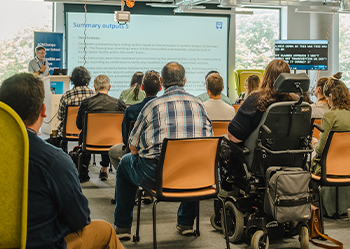University News Last updated 16 July 2024

Birmingham City University (BCU) is leading the way in accessible and inclusive technology – and staged the inaugural Association for Computing Machinery (ACM) Europe Summer School at the iconic STEAMhouse from 24-27 June 2024.
Researchers, industry professionals, and PhD students shared their expertise in accessible computing, inclusive design, disability innovation, and assistive technologies, before discussing how theory could be applied in practice.
Dr Arthur Theil, a lecturer in human-computer interaction at BCU, pitched the conference to ACM as “an essential way to ensure everything we design is accessible for everyone”.
Sixteen million people in the UK are disabled, including 11% of children. One in four people in the workplace have disabilities, rising to one in two people at pension age (Scope 2022).
“Many people become disabled within their lifetime,” Dr Theil explained. “We need responsible technologies, including AI, that support people and don’t cause extra challenges.
“Not only is it morally right. It’s increasingly a legal obligation. The European Accessibility Act 2025 is expected to launch next year. We also have UK 2018 accessibility regulations.
“As new legislations emerge, it’s important for computer scientists to think about accessibility more seriously. It’s our responsibility to design a more inclusive world through technology.”
By establishing and hosting the first ACM Summer School in Europe, BCU is becoming internationally renowned for its expertise in accessibility and inclusive design.
Dr Theil added: “We’re delighted to host this landmark conference, funded and supported by the ACM. It’s an excellent legacy. For us, it’s important to connect BCU researchers and PhD students with other academics, to share their work and foster collaboration early on.”
At the conference, researchers considered how they could involve disabled communities in their work. The benefits of collaborating with disabled people to design more accessible technology far outweigh any challenges, in terms of the time and resource it takes.
“Creating accessible technology is only possible through genuine collaboration,” Dr Theil said. “Only when we combine our technological experience with peoples’ lived experience, can we address challenges and design things disabled people find truly useful.”
Professor Cathy Holloway, co-founder and academic director of the Global Disability Innovation Hub, echoed this sentiment during her keynote talk on day one.
She stressed the importance of moving from research to positive impact by collaborating with disabled groups, particularly in the global south where access is more limited.
Fostering equality when using AI was another important discussion point.
“AI is changing the world,” said Dr Theil, who is part of BCU’s Human Computer Interaction research group. “We must ensure it’s fair for people with disabilities.
“AI can support people with jobs and education – through generative AI, summarising and simplifying content, and text to speech (and vice versa) – but it can also be used negatively. We need to understand how to use it positively and responsibly to provide access.”
Professor Hanifa Shah, Pro-Vice-Chancellor and Executive Dean of BCU's Faculty of Computing, Engineering, and the Built Environment, said: "Hosting this prestigious international event is testament to the expertise of this research group, which specialises in developing inclusive technologies.
“I'm confident the new collaborations and insights shared at the event will impact the wider community, progress accessibility research, and contribute to tangible outcomes."